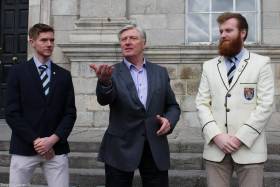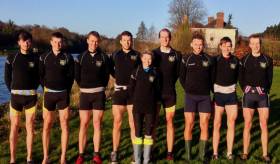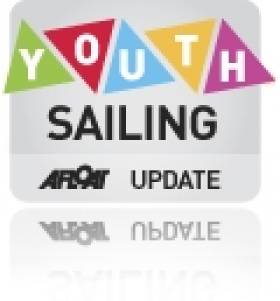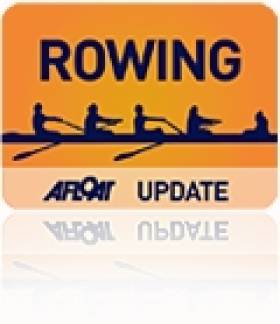Displaying items by tag: Colours Races
Mixed Results for Trinity Crews in Colours Races Coin Toss
It was mixed results for Trinity rowing crews in the coin toss for the annual Colours Boat Races yesterday (Sunday 27 February).
Round Ireland sailor and adventurer Mark Pollock was on hand to flip the coin at the steps of TCD’s Dining Hall, with the Dublin University Boat Club losing the toss for the men’s race — they will take the south station for the Gannon Cup and Dan Quinn Shield against UCD Boat Club.
Trinity’s women faired better, with the Dublin University Ladies Boat Club winning their toss — they chose to race on the south station for the Corcoran Cup and the Sally Moorhead Trophy against UCD’s women.
The 2022 Colours Boat Races, which return after a two-year break amid the COVID-19 pandemic, take place on the River Liffey from O’Connell Bridge to St James’ Gate on Friday 18 March.
UCD take Gannon Cup after Tough Battle
#Rowing: UCD won the Gannon Cup for senior men and Trinity the Corcoran Cup for senior women at the Colours Races in Dublin today.
Trinity lead early in the Gannon, but once the crews came through Grattan Bridge, UCD pushed into the lead. The lead stood at one length through the next four bridges, but Trinity whittled it to two-thirds from there, making for a good finish. UCD held on to win.
Trinity were outstanding winners of the Corcoran Cup. They carved out a big lead early on and went on to win easily.
UCD’s novice women also built on a good start to win the Sally Moorhead trophy, while Trinity won the men’s novice race and took the Dan Quinn Shield.
Colours Races 2019, Dublin
Gannon Cup (Senior Men): UCD (Rob Brown, Jack Stacey, Andrew Goff, Shane O’Connell, Thomas Earley, Andrew Kelly, Cameron Murphy, David O’Malley; cox: Orlagh Reid) bt Trinity 2/3 l
Corcoran Cup (Senior Women): Trinity (Anna Mangan, Ellen Clohessy, Ruthie McHugh, Jane Hogg, Aoife Corcoran, Erika Deasy, Miriam Kelly, Aoife McGranaghan; cox: Clare White) bt UCD easily
Dan Quinn Shield (Novice Men): Trinity bt UCD 3l
Sally Moorhead Trophy (Novice Women): UCD bt Trinity 3l.
UCD Rowers Win the Spin In First Colours Battle
#Rowing: UCD won both coin tosses and will row from the North Station in all four Colours races on the Liffey on March 18th. Pat Kenny performed the coin toss at Trinity College, assisted by the four captains: Emma Thornton (UCD Ladies Boat Club); Laura Walsh (Dublin University Boat Club), Shane Mulvaney (UCD Boat Club) and Conor Ryan (Dublin University Boat Club).
The toss was set for early in the week but was delayed until Thursday.
The schedule set for Sunday, March 18th, is:
10:30 Sally Moorhead Trophy (novice women)
11:00 Dan Quinn Shield (novice men)
11:30 Corcoran Cup (senior women)
12:00 Gannon Cup (senior men)
UCD Take Gannon and Corcoran Cups
#Rowing: UCD carried off the Gannon and Corcoran Cups for senior men and women in the Colours races on the Liffey today. In both races, strong starts in the difficult conditions were the key. In the Corcoran Cup, the bigger and more powerful UCD women’s crew had one quarter length by the Ha’penny Bridge, and coming through Capel Street Bridge they extended it to over a length. They went on to win comfortably. The UCD men’s crew also got off the start much more smoothly than Trinity. Trinity mounted a number of attacks down the course, but UCD held them off and won by over a length.
The novice men’s race for the Dan Quinn Shield provided Trinity with a chance to impress, with the crew in white taking command early and having the race won by the Four Courts. The novice women’s race was similarly one-sided, with UCD having only to paddle home after Trinity’s stroke woman caught a crab after only a few seconds of the race.
Colours Races 2016, O’Connell Bridge to St James’s Gate, Saturday:
Men – Senior (Gannon Cup): UCD (E Gleeson, D Somers, T Hughes, A Griffin, E O’Connor, M Murphy, S Mulvaney, D O’Malley; cox: O Reid) bt Trinity 1 1/3 l . Novice (Dan Quinn Shield): Trinity bt UCD, easily.
Women – Senior (Corcoran Cup): UCD (D Callanan, J Coleman, A O’Riordan, E Lambe, O Finnegan, R Gilligan, S Bennett, K O’Connor; cox: J Gilligan) bt Trinity a distance. Novice (Sally Moorhead Trophy): UCD bt Trinity easily.
Trinity Win Colours Team Race in River Liffey Test
#coloursmatch – The annual Colours races between UCD and Trinity underwent a revitalisation this year, with a new location, new format and all new commentary. It was run over the whole day on Saturday (12th April). The event was held in the heart of Dublin city, in front of the Convention Centre on the Liffey. Spectators watched from the quays and the MV Cill Airne, while listening to Chris Tordoff, Ireland's most talked about sailing commentator.
The Colours match was organised from a sailing point of view by the Royal Alfred Yacht Club, using material provided by the Royal St George. Poolbeg generously allowed their premoses and pontoons to be used.
A full schedule of races was completed, with all the teams bar the firsts and alumni taking part in 2 round robins, of which UCD 2 and UCD 4 won the Gold and Silver round robins respectively. The alumni races were held shortly after, and Trinity came out on top in their best of 3 race, where some of the past leaders of each club fought it out, trying to remember their skills from their college days.
The ladies race which was scheduled unfortunately did not get to be completed due to the time restrictions on lifting the East Link bridge to get the boats back out to Poolbeg Yacht and Boat Club. However, while UCD came out on top in both round robins, the title of Colours Champions goes to whichever college wins the best of 5 races between the colleges. UCD were favourites after their win at Varsities in February, however Trinity had been training hard to break UCD's winning streak over the past 4 years. With the flow in the river picking up pace, the highly contested races began with a large crowd gathered on the MV Cill Airne to watch.
Trinity had great starts, and took an early lead in the first 2 races to hold on and win both. With UCD's hopes coming down to the do or die 3rd big performance was needed. The 3rd between the sides a few times, until Trinity pulled out a very solid final beat to go on to win their first Colours match in 4 years. The winning Trinity team was Scott Flanigan, Lucy Bolger, Jack Hogan, Iain Irvine, Rich Roberts and Ally Dix.
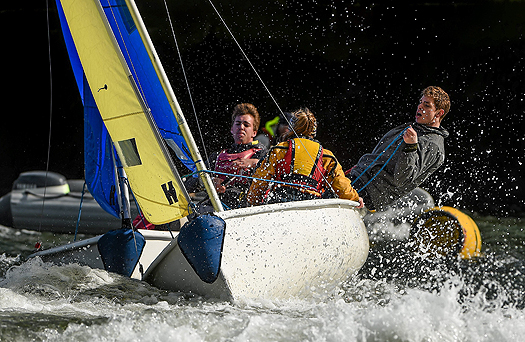
Cillian Dickson, right, and Albha McDermott, Trinity College, in action against Cian Mollen, University College Dublin, left, during their race. Photo: Pat Murphy/Sportsfile
The Colours match marks the end of the college sailing circuit for 2013/14. While there was not much sailing achieved at the 3 events before Varsities, it was still a remarkable year. UCD won one of the tightest Varsities finals in years, the Student Yachting Nationals in Howth were incredibly close between the 8 J80s, and Colours was run with unparalleled success. Colours on the Liffey should become a yearly event after its success this year.
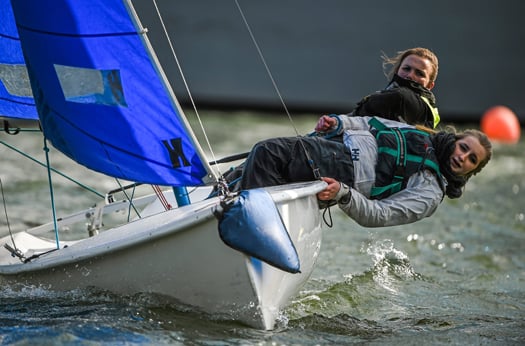
Sophie Murphy and Ali Moorhead, University College Dublin. Photo: Pat Murphy/Sportsfile
Thanks must be given to Energia and Bank of Ireland for their support in running the event, without which the event definitely would not have taken place, and to the MV Cill Airne for hosting the sailors during the day and night.
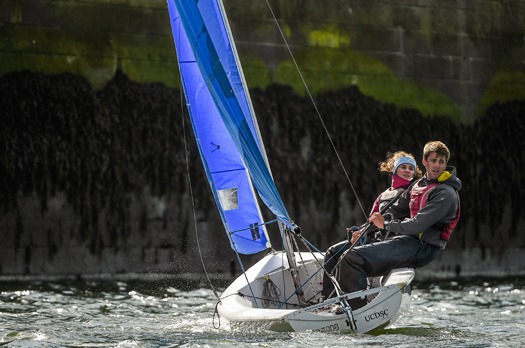
Cian Mollen and Emily Jones of University College Dublin. Photo: Pat Murphy/Sportsfile
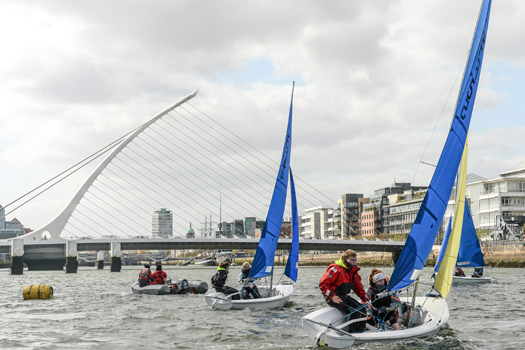
In the shadow of the Samuel Beckett bridge. A general river Liffey view of the racing action during the final race between University College Dublin and Trinity College. Photo: Pat Murphy/Sportsfile
The Winner's View...
Trinity College Sailing reports on how its 2014 sailing season finished with a bang, beating the UCD favourites to win the Colours for th first time in five years
For the first time ever, the annual colours match between arch rivals Trinity College Dublin and their noisy neighbours UCD took place on the River Liffey. UCD commodore Vinnie Varley pulled out all the stops and had the bridge lifted for all 12 boats to sail to the race area which was beside the MV Cill Airne. There was serious tension between the two colleges in the lead up to the event, with UCD snatching a win from TCD on countback in the Student Yachting Nationals the week before along with the usual undertones from the Belfield campus.
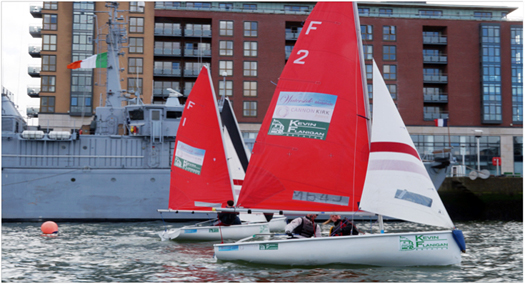
TCD Alumni, helms Jake Mealy, Luke Finnegan and Christopher O'Reilly won their best of three series, starting off Trinity's victory. Photo– Stephen Doyle/Vision Media
All sailors were faced with very challenging racing conditions aside from the shifty and gusty breeze. With one eager fresher commenting "There were obstacles such as the Liffey Barge that we were not normally used to having to deal with!". Spectators watched from the MV Cill Airne where running commentary was provided by The Viper, who's focus was more on tales of ferry journeys than on the fireflies!
The morning provided a different running order to usual, with the 2nd-5th's racing in a round robin. The Trinity faithful were spurred on following the return of the familiar face of Finn Murphy , who spurred the "Fighting fifths" on up the last beat to secure one of the most dramatic wins of the day. TCD 2 went unbeaten in the morning round robin with the young guns of TCD 4 also putting in a big performance to pave the way for an upset.
After a mid day interval for lunch, the TCD alumni went out to set down a marker for the afternoon. Winning their side of the event 2-1 added to the shift in momentum towards the much debated rebranded "Trinity College, The University of Dublin. "
The colours match, decided on the result of the race between the two first teams, has a funny history of long winning streaks. Until 2010, Trinity had won four years in a row from 2006 and since then UCD were on a roll themselves during a golden period. Trinity were fired up to prevent UCD achieving the elusive five in a row and started strongly with a 1,2 off the line in the first race of the best of five series. This was followed up by another commanding 1,2 win setting up a tantalising prospect for the Trinity fans of a whitewash against the favourites and current Intervarsity champions.
TCD Alumni, helms Jake Mealy, Luke Finnegan and Christopher O'Reilly won their best of three series, starting off Trinity's victory.
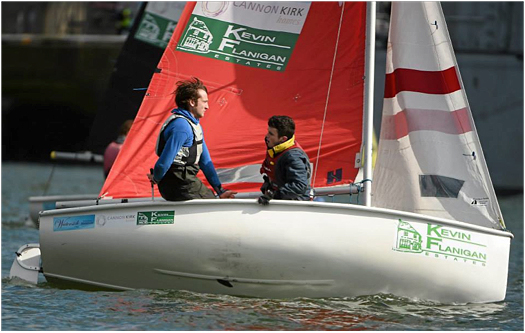
Jack Hogan and Iain Irvine (TCD 1) on the way to a comprehensive win. Photo: Pat Murphy/Sportsfile
The final race had all the supporters raised from the comfort of their seats on the Cill Airne as the drama continued right until the last beat, where Trinity converted back from a 1,4,6 into a 1,2,3 to take the Colours match by 3-0 in the best of five series. It was fantastic to hear chants of TCD across the Liffey within a few hundred metres of the iconic Front Square.
Unfortunately due to time constraints, the ladies race had to be abandoned however there were several unconfirmed sources claiming that fear had struck given the talk of Ally Dix's proposed return to the helm.
The win marks a sign of great progress for The University of Dublin as they look to rebuild towards another golden period of their own. A renewned sense of pride in our teams performances was notable.
The clubs main focus for the 2013/2014 season was on an increased racing schedule which involved three Uk trips. These were only possible due to the kind sponsorship from the TCD Alumni fund, who helped finance members from our top three teams competing in Cambridge. We would also like to thank our other main sponsors from Waterside Malahide, Cannon Kirk and Kevin Flanigan Estates who contributed greatly throughout the year towards subsiding our competition costs.
If you would be interested in sponsorsing our club or the colours event for the 2014/2015 please email [email protected] . As can be seen from the images substantial advertising space is available.
A huge thank you must go to UCD for organising such a fantastic event and also to all those who came to support from both Universities. No doubt this event will continue to go from strength to strength in it's new location.
TCD 1: Scott Flanigan/Lucy Bolger, Jack Hogan/Iain Irvine, Richard d'Esterre Roberts/Ally Dix
TCD 2: Harry O'Reilly/Kerrie O'Leary, Cillian Dickson/Alva McDermott, Jennifer Andreasson/Charlotte Murphy
TCD 3: Amy Swinglehurst/Emma Flood, Patrick Collins/Amelia O'Keefe, Annabel Elliot/Max Hickey
TCD 4: Dermott O'Flynn/Larragh Lee, Brian Carthy/Anna Hayes, Paul Martin, Florence Fanning
TCD 5: Finn Murphy/Louise O'Callaghan, James Eggers/Alison Greene, Michael Craig/Christabel Cavey
TCD Alumni: Jake Mealy/Rachael Flood, Chris O'Reilly/Alice Wyse Jackson, Luke Finnegan/Colm McLovin
UCD Rowers Take Gannon and Corcoran Cups Again
# ROWING: UCD produced an exact repeat of last year in the Colours Races on the Liffey today by winning the senior men’s and women’s events and also taking the novice men’s race. Trinity again won the women’s novice eights race with a dominant performance.
The senior men’s race was won in the first 20 metres: UCD’s big crew gained a crucial advantage and exploited it so competently that they had the race in the bag by the Four Courts. The win gave Dave Neale a record sixth Gannon Cup crown.
The UCD senior women also started well and established a good lead, but Trinity nipped away at them down the course and lost by only a half length.
The men’s novice eight race ended before the line, as Trinity crashed into the wall after Watling Street Bridge due to a snapped steering line. UCD had taken the furthest south arch in Winetavern Street bridge, prompting a Trinity objection, but the race umpire said that he had told the crew to avoid the marked centre lane due to a possible hindrance there.
Colours Races 2013
Men – Eight, Senior (Gannon Cup): UCD (L McCarthy, M Bailey, P Moore, A Sheehan, D Neale, J Nihotte, G Duane, P Grogan; cox: K Joyce) bt Trinity 4l
Eight, Novice (Dan Quinn Shield): UCD bt Trinity not rowed out
Women – Eight, Senior (Corcoran Cup) UCD (A O’Riordan, K Joy, O Finnegan, S Bennett, C Ni Reachtagain, G Collins, A Gilligan, B Lait; cox C McGowan) bt Trinity ½ l
Eight, Novice (Sally Moorhead Trophy): Trinity bt UCD easily.


























